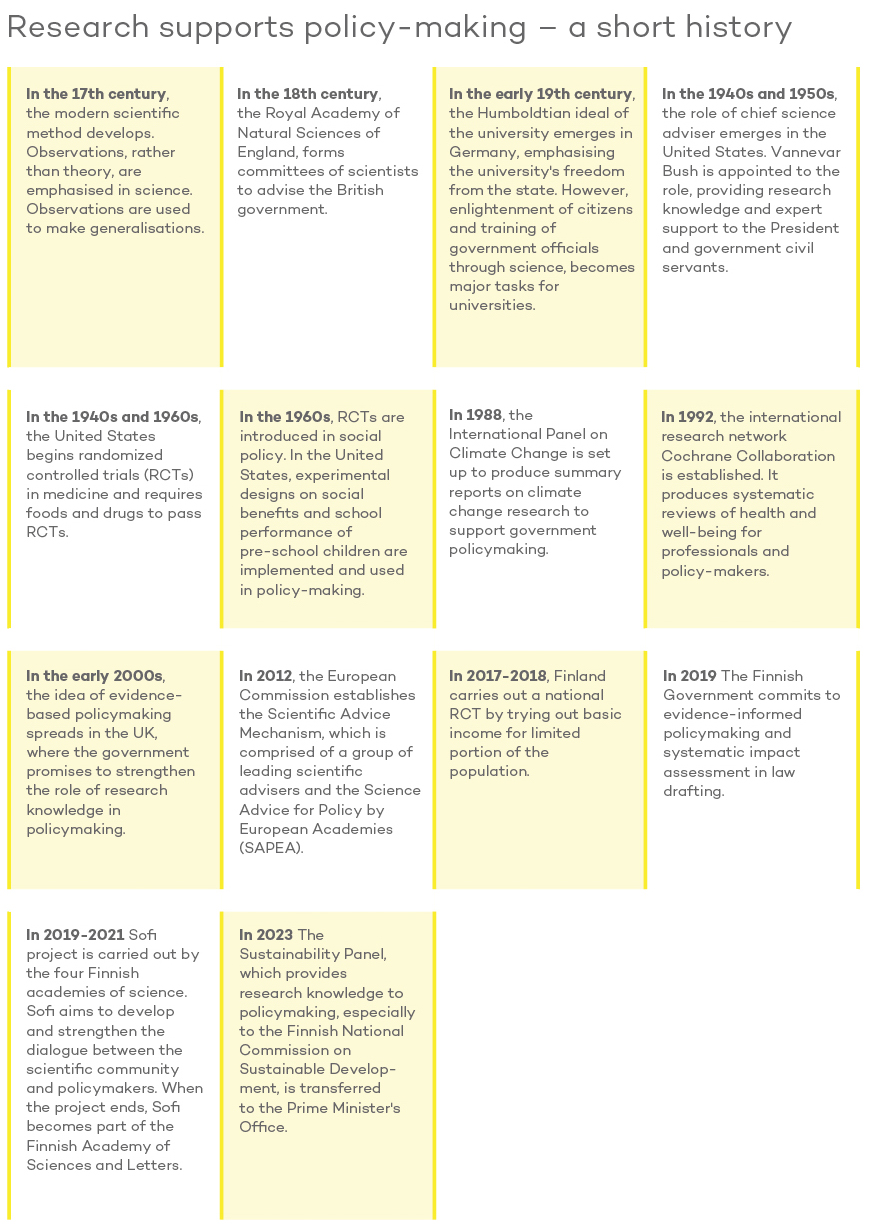Part 1. Introduction to interaction between research and policy
Research knowledge broadens and deepens the foundation upon which significant decisions concerning societal development are made. To reach policy-makers, such as members of parliament, civil servants and regional and local councillors, there are many paths one can take. Researchers can choose the paths that are most suitable for them, act in different roles and promote, for their part, the inclusion of research knowledge into policy-making.
The above describes the way this course approaches the interaction between research and policy-making. Understanding the different aspects of interaction will help you conceptualise the societal significance of research and understand your personal capacity to impact societal development.
Policy-makers are interested in the impact research has on societal development
Especially in the 2000s, a new kind of attention has been paid to the role that universities and research knowledge play in society. The idea of evaluating and promoting the societal impact of research has become more common in science policy. This emphasis has made societal impact a significant factor in research funding. Universities have also begun to evaluate their own impactfulness and develop their services regarding science communication, for example.
Simultaneously, government programmes have set goals for closer cooperation between researchers and the administration and systematic utilisation of research in the drafting work of ministries, for example. For interaction between research and policy, the new millennium has meant a diversification of channels and operating models , i.e., a transition from the efforts and visibility of single individuals to more network-like interaction.

Research supports policy-making – a short history
Even though the societal impact and role of research in policy-making has now become highlighted in research funding decisions, state administration and universities, a close relationship between researches and society is not a completely modern phenomenon.
However, modern trends bring new importance to skills and measures aimed at promoting the impact made by researchers. For example, emphasising impact in funding decisions has steered researchers to allocate more of their time and energy to how they plan and implement interaction.
The requirement of impactfulness and growing demand for research knowledge place new pressures on researchers while also creating new opportunities for making a difference.
In this course, interaction between research and policy-making is discussed as a group of various means of knowledge transmission or channelling. These means can be based on discussions where researchers and civil servants from a certain ministry, for example, exchange ideas and come together to build insights into the theme at hand (e.g., in workshops). They can also be based on publications and other writings, in which case insights are transferred from researchers to members of parliament, for example (via research reports, columns, statements etc.).
In addition to researchers, these means are also utilised by other operators working to support policy-making, such as knowledge brokers. Overall, the interaction between research and policy is analysed in the course as a channel of promoting the societal impact of research.
Research supports policy-making in numerous ways
The duties of policy-makers differ from each other. For example, the civil servants of a ministry plan and draft the policies included in the government platform, including laws or programmes for allocating public funding. Members of parliament, for their part, promote the policies of their respective parties and work in parliamentary committees where they evaluate the drafts of policy measures prepared in the ministries.
The ways in which policy-makers utilise research knowledge depends on such factors as how well-suited the knowledge is for their duties, what the current stage is in the process of policy-making and the policy-maker’s views on the utility of the research knowledge. We will delve more deeply into this aspect of the matter later on in the course.
Research benefits policy-making in diverse ways. Research brings to light new societal issues and perspectives, describes and explains the possible consequences of different solutions, demonstrates what we do know and what we do not know, supports the existing views of policy-makers and offers recommendations on how to proceed in terms of policy. Even though the impacts of research knowledge can be dissected in various ways, these impacts are not always visible in concrete terms. Gaining knowledge about changes in attitudes and conceptions is difficult, and this kind of change cannot be substantiated during an interview situation, for example. Furthermore, research knowledge is not something that is usually systematically referred to in government policy documents in Finland.

Science communication is one way of implementing interaction
In recent years, the discourse on promoting the societal impact of research has focused on science communication, i.e. , the popularisation of research.
There are various means of science communication:
- Blogs and social media enable discussion. They are platforms where one can popularise research knowledge freely and with little effort. However, participating in the discussion can be tiring, and the published information does not necessarily gain the intended attention.
- News articles and other media performances guarantee extensive visibility for the knowledge. On the other hand, it takes time and effort to publish columns in newspapers, for example, and it is not certain that one will be interviewed in the media as an expert.
However, policy-makers follow public discourse and media publications, and the new phenomena and perspectives highlighted via products of science communication may well become a part of political discourse. The strength and weakness of science communication is that the publications are often based on the researchers’ views of what is important and how the messages should be shaped and worded. The researchers get to utilise all of their expertise in the popularisation of the knowledge and make all the decisions themselves. On the other hand, policy-makers often have specific needs for which blog posts and expert interviews might not produce useful content.
Science communication as described above is an important means of promoting the societal impact of research. On the other hand, the tools of science communication only form a small part of the total field of interaction.
Various practices underpin the interaction between research and policy
The following are examples of practices related to the interaction between research and policy:
Practices based on publishing:
- Researchers produce knowledge, such as reports, policy recommendations and articles that they relay to policy-makers. This kind of activity falls under science communication.
- Researchers produce commissioned research based on a question posed by policy-makers. The researchers answer this question either with new or already existing research knowledge.
- In publishing-based practices, the roles of researchers and policy-makers are based on the differentiation between knowledge producers and knowledge users.
Practices based on co-production:
- Co-production practices are based on the immediate exchange of ideas and thoughts between researchers and policy-makers in workshops or meetings, for example.
- The roles of the parties as knowledge producers and users is not emphasised and in co-production researchers and policy-makers meet as experts who are jointly forming an understanding of the matter at hand.
- The participants in co-production often share the same goal, which means that the discussions often strive to reach a certain limited end result, such as the drafting of a legislative proposal.
Both of these practices can be – and often are – part of the researchers’ toolbox. Co-production can also be useful in setting research topics and questions, and research publications can be used as the starting point in co-production events. We will be delving more deeply into the various means and paths of interaction in the third section of the course.

The field of interaction is in flux
In recent decades, the way research supports policy-making has changed.
The following changes have taken place in policy-making:
- Evidence-informed policy-making and information and knowledge management have become more commonplace. To support the systematic utilisation of research knowledge, financial instruments have been developed to meet the knowledge needs of government ministries and other such institutions (Strategic Research Council and the Government’s research and survey activities).
- The focus of thinking has shifted from the sectors of policy-making toward phenomenon-based administration, which has resulted in increased cross-administrative cooperation between ministries and other institutions.
The promotion of societal impact has changed in the following ways:
- The evaluation of societal impact has been balanced by supporting measures that aim at making an impact. This has meant an increase in the number of impactfulness courses and science communication services offered to university students and researchers.
- There has been a shift from the communication efforts of individual researchers to more diverse channels for fostering societal impact. This has meant an increase in the number of interaction-supporting operators, such as knowledge brokers, and opportunities to participate in policy-making together with other researchers.
Together these developmental trends have allowed for a wide variety of different routes for transmitting research knowledge into policy-making. At the same time, the demand for multidisciplinary research knowledge has increased.

Tip: There is no need for you to engage in impact work on your own. For support, you could look into the communication specialists at your university or familiarise yourself with other operators in the interaction space outside of your university. For example, knowledge brokers such as the Forum for Environmental Information, the Finnish Expert Panel for Sustainable Development and the Finnish Academy of Science and Letters specialise in promoting and developing dialogue between researchers and policy-makers. Knowledge brokers organise events where researchers and policy-makers can encounter each other. They also compile research knowledge to be used in the drafting of legislation, for example. Because of the cross-administrative issues of today, you should also prepare to work together with researchers from other disciplines and strive to have an open mind toward new perspectives and ideas.
In conclusion
The interaction between research and policy consists of a diverse set of methods that are being constantly developed. There is no single way of transmitting research knowledge that applies to all situations and meets all needs. Development efforts follow the needs created by societal phenomena and recognised in policy-making. The development also leans on the views of operators bringing researchers and policy-makers together on how the interaction can be realised most sensibly and effectively.
So, you do not have to operate on your own in the changing and diverse space! Promoting the impact of research is long-term work that will gradually lead to interesting contacts and new skills, as well as an understanding of what impact work actually is.
At the end of each section of the course we will present one oft-repeated prejudice related to the interaction between research and policy. We offer our own perspective on the matter and thus strive to bust the myths.
